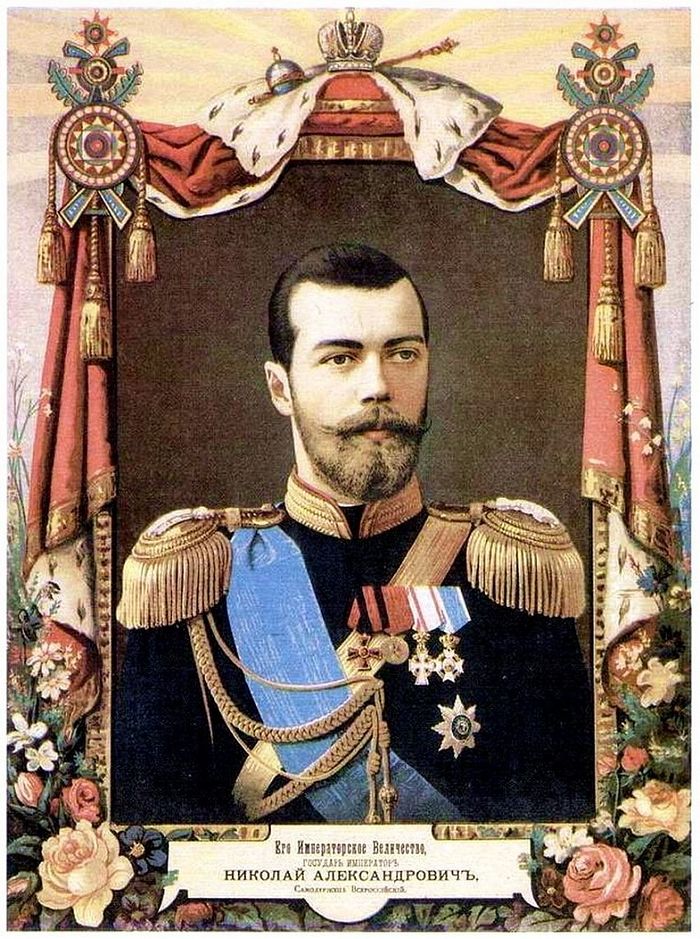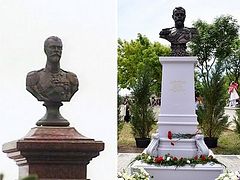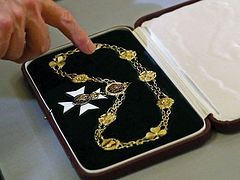Source: Royal Russia
May 18, 2016
On 18 May (O.S. 6 May) 1868 in the Alexander Palace at Tsarskoye Selo, was born the first son of Emperor Alexander III and Empress Maria Feodorovna, the Grand Duke Nikolai Alexandrovich - the future and last Emperor of Russia - Nicholas II.
Nicholas passed his childhood years growing up in Gatchina Palace. The future emperor had been educated in compliance with an accurately designed thirteen year program. During the first 8 years particular attention was devoted to subjects such as political history, Russian literature, French, German, English, and gymnasium; the next five years were devoted to studying military affairs, legal and economic sciences, necessary for a statesman. Among his tutors were outstanding Russian scholars: N. N. Beketov, N. N. Obruchev, J. F. Cui, M. I. Dragomirov, N. J. Bunge.
In 1884 Nicholas joined the military service, and in July 1887 he joined the Preobrazhensky Regiment. Prior to ascending the throne, Nicholas commanded – as a colonel - the first battalion of the Life Guards Preobrazhensky Regiment.
Having a notion about public affairs, Nicholas began to attend meetings of the State Council and the Committee of Ministers from May 1889. In October 1890 he went on a voyage to the Far East. During the first 9 months, he visited Greece, Egypt, India, China, Japan, and then by land, having crossed the entire Siberia, returned to the capital of Russia.
In April 1894 the future Emperor became engaged with Princess Alice of Hesse Darmstadt, the daughter of Grand Duke of Hesse, granddaughter of Queen Victoria of England. After her conversion to Orthodoxy, she took the name Alexandra Feodorovna.
On 2 November (O.S. 20 October), 1894 his father Emperor Alexander III died at the young age of 49. A few hours before his death, the dying emperor obliged his son to sign a Manifesto on his accession to the throne.
During the reign of Nicholas II, Russia was being transformed into a major agro-industrial nation, the cities grew, railroads and industrial enterprises were being rapidly developed. The Emperor supported the decisions aimed at economic and social modernization of the country: introduction of the gold circulation of the ruble, Stolypin's agrarian reform, laws on workers' insurance, universal primary education, and religious tolerance.
The Reign of Nicholas II took place in an atmosphere of growing revolutionary movements and the complexity of the situation of foreign policy (Russian-Japanese War of 1904-1905, Bloody Sunday, Revolution of 1905-1907; First World War, February Revolution of 1917).
Under the influence of a strong social movement in favour of political reforms, the Emperor signed the Manifesto of 17 October 1905, proclaiming democratic freedoms. On 6 May (O.S. 23 April), 1906 he approved a new edition of “Fundamental laws of the Russian Empire”, and in 1906 the State Duma began its work established by the emperor’s Manifesto.
The turning point in the fate of Nicholas II was the year of 1914 - the beginning of World War I, which worsened internal problems of the country. In Petrograd unrests began, which grew into mass demonstrations against the government and dynasty. On 15 March (O.S. 2 March) 1917 in Pskov, Nicholas II signed an act of abdication, handing power to his brother Grand Duke Mikhail Alexandrovich, who rejected the crown.
On 20 March (O.S. 7 March) 1917, the Provisional Government ordered the arrest of Nicholas and his wife. In early August 1917 the former emperor and his entourage were exiled to Tobolsk in Siberia. In May 1918, they were transferred to Ekaterinburg. On the night of 16 (O.S. 3) / 17 (O.S. 4) July 1918, Emperor Nicholas II, Empress Alexandra, along with their five children and four of their faithful retainers were murdered by the Ural Soviet.
After years of research of the remains found near Ekaterinburg in the 1990s, they were solemnly buried in Peter and Paul Cathedral in St. Petersburg on 17 July, 1998. In 2000, Nicholas II and the members of his family were canonized by the Moscow Patriarchate. The Imperial family had been canonized in 1981 by the Russian Orthodox Church Outside Russia (ROCOR).





